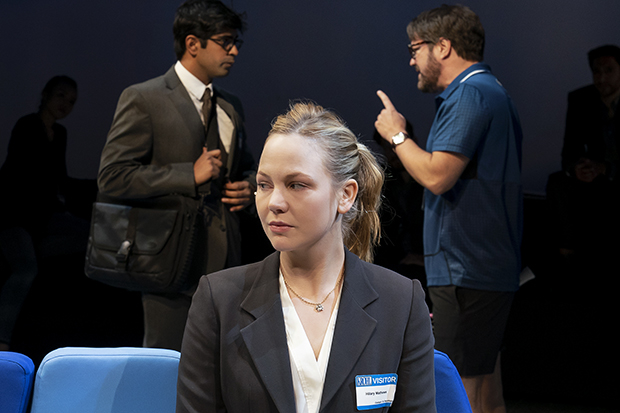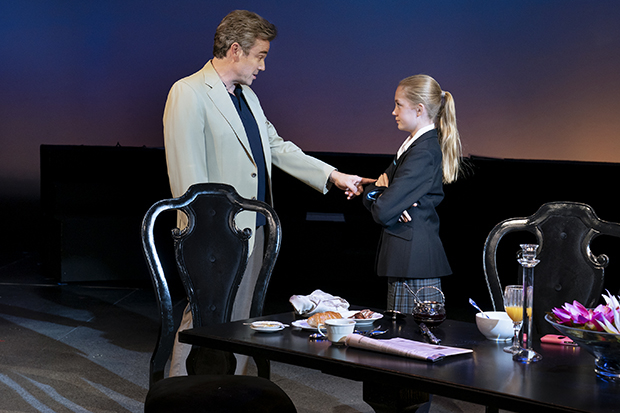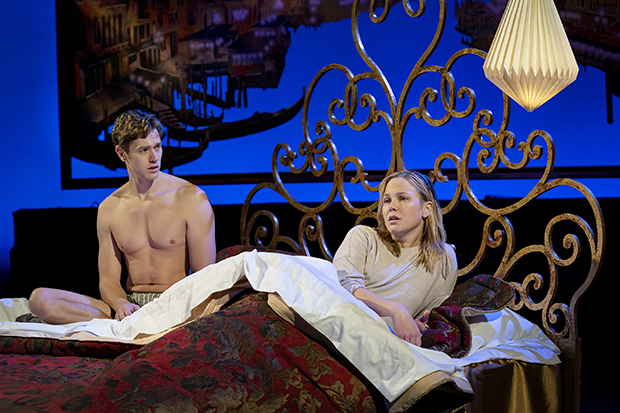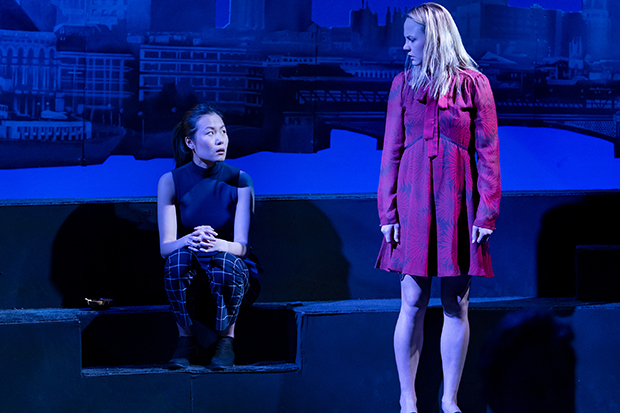The Hard Problem and the Difference Between the Brain and the Mind

(© Paul Kolnik)
True wisdom is the ability to admit what you don't know, and Tom Stoppard has given audiences ample opportunity to feel wise for the past half-century. The author of Arcadia and Travesties returns to Lincoln Center Theater with his latest play, The Hard Problem, now receiving a sleek production by director Jack O'Brien (Tony winner for his staging of Stoppard's monumental trilogy at LCT, The Coast of Utopia). The play raises some of the most profound questions of our existence, yet its emotional temperature never rises above the autumn chill.
The hard problem of the title is that of consciousness: What, if anything, distinguishes thought and emotion from a computer operation? If we're all hardwired for genetic self-interest, what explains altruism? Does it even exist? Hilary (Adelaide Clemens) thinks it does. She's a psychology student competing for a doctorate slot at the prestigious Krohl Institute, a neuroscience research facility underwritten by hedge fund billionaire Jerry Krohl (Jon Tenney playing a muted supervillain). He's interested in how brain science can be harnessed to predict behavior in a regularly irrational market.

(© Paul Kolnik)
By chance, Hilary runs into her high school friend, Julia (Nina Grollman), while waiting for her interview with her potential boss, Leo Reinhart (Robert Petkoff). Julia teaches pilates at Krohl, but her partner, Ursula (Tara Summers), is a scientist at the institute, and she advises Hilary that Leo is most interested in "the hard problem." So when Leo asks her in the interview how consciousness comes about, she responds, "I have no idea, and nor does anyone else. I thought that's why we're here. To crack the hard problem." Julia may believe in altruism, but when it comes to getting this job, she's going to use every resource at her disposal to squash the competition.
Stoppard is our most intelligent living playwright, and it is a testament to his brilliance that we see his probing questions in every layer and moment of the play. The Hard Problem fully engages us intellectually, but emotionally, it feels distant and contrived. The big emotional reveal is obvious from the minute it is set up, and the points of high drama seem to emerge from the scenery, including characters excusing themselves offstage before deigning to cry. Luckily, most of them are English, so such extreme emotional forbearance at least feels realistic.

(© Paul Kolnik)
It helps that the cast delivers convincingly human performances, especially Clemens, who shows us several angles of a scientist who is also religious. Her colleague and casual sex partner, Spike (an unfailingly condescending Chris O'Shea), walks in on her praying and gives her a hard time about it. Their exchanges are some of the most combustible in the play.
Their arguments about consciousness (which are really the main event) are snappy and clear under O'Brien's lucid direction. David Rockwell's nimble set creates evocative locations while providing for smooth transitions executed by the black-clad cast. Catherine Zuber's quick-change costumes seem to instantly activate the actors into full characters in living color. Bob James's complex original piano music gives us something beautiful to hear as we digest the previous scene and brace for the next.
Sometimes, O'Brien has several of the actors not in the current scene seated on an upstage kiva with their scripts at the ready, like actors at a rehearsal. This convention is never consistent and its purpose unclear. Is he saying that humans, unlike computers, have the ability to watch and learn? Or do we have the ability to watch and form opinions that contradict the logical conclusion a computer might make?

(© Paul Kolnik)
As usual, Stoppard leaves his audience with plenty to discuss and debate as we exit the theater. When so many aspects of our lives are governed by irrational, unreasonable people, it seems self-evident that not everything can be explained away by genetics and biology. The Hard Problem doesn't pretend to offer a definitive answer why, but it is asking all the right questions.










